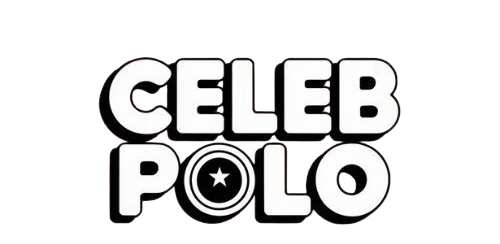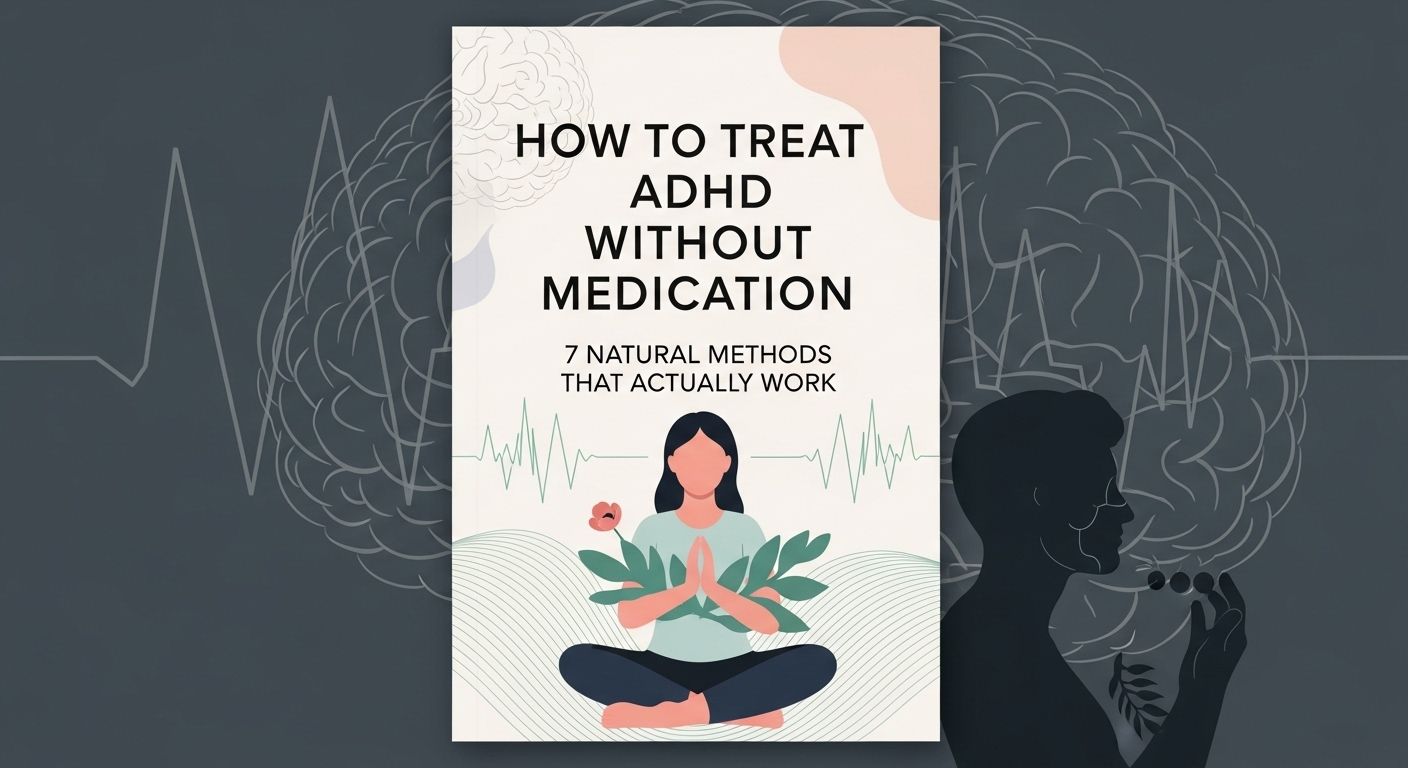Living with ADHD can feel overwhelming. Many people worry about medication side effects. Parents seek safer options for their children.
The good news is that natural ADHD remedies can be incredibly effective. Research shows that non-medication ADHD treatment approaches work well for many individuals. These evidence-based ADHD strategies offer hope without the risks of prescription drugs.
What Are the Most Effective Natural Treatments for ADHD?
Behavioral therapy for ADHD leads the list of effective treatments. The CDC recommends it as the first-line treatment for children under six. This approach teaches valuable coping skills. It helps families manage daily challenges better.
Exercise ranks second among natural remedies for attention deficit disorders. Physical activity boosts brain chemicals naturally. It improves focus and reduces hyperactivity. Regular movement acts like natural medication for the brain.
Nutrition plays a crucial role in ADHD symptoms management. A balanced diet supports brain function. Certain foods can worsen symptoms. Others help improve concentration and behavior.
Sleep optimization cannot be ignored. Poor sleep makes ADHD symptoms worse. Good sleep habits create a foundation for better daily functioning. This simple change often brings dramatic improvements.
READ THIS BLOG : How to Make Perfect French Chantilly Cream: The Ultimate Recipe Guide?
How Does Exercise Help Manage ADHD Symptoms Naturally?
Exercise works like natural medication for ADHD brains. It increases dopamine and norepinephrine levels. These brain chemicals are often low in people with ADHD. Physical activity literally rewires the brain for better function.
Cardiovascular exercise shows the strongest benefits. Running, swimming, and cycling work exceptionally well. Just 20-30 minutes daily can make a significant difference. The effects last for hours after exercise ends.
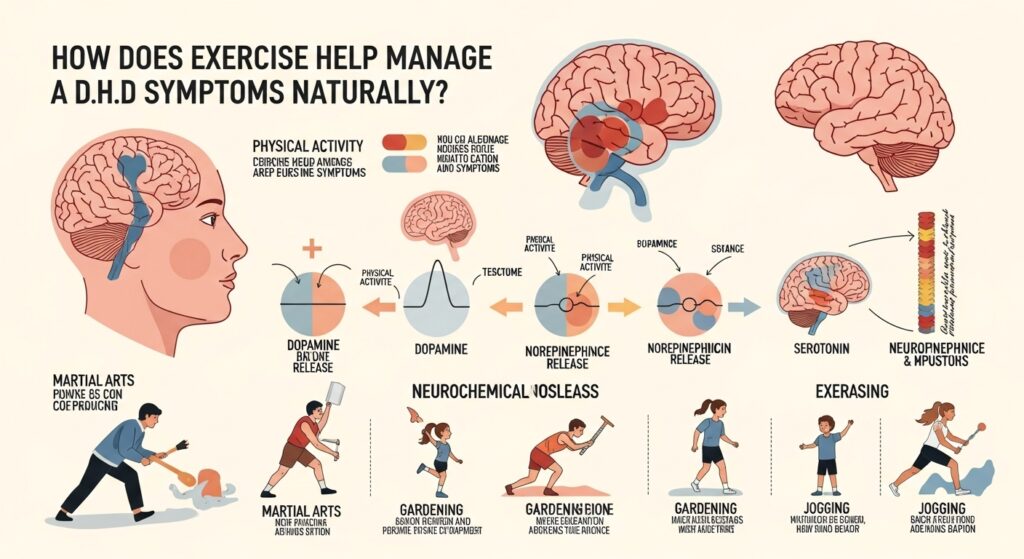
Hyperactivity management becomes easier with regular movement. Children who exercise show less disruptive behavior. Adults report better focus at work. The energy gets channeled into productive activities.
Team sports offer additional benefits. They teach social skills and rule-following. Martial arts improve discipline and self-control. These activities combine physical and mental training perfectly.
Can Diet and Nutrition Really Improve ADHD Without Medication?
Nutrition-based ADHD treatment shows promising results. Research links certain foods to symptom improvement. A Mediterranean diet rich in omega-3s helps brain function. Whole foods provide steady energy without crashes.
Sugar and processed foods often worsen symptoms. They create energy spikes followed by crashes. Chemical colors and preservatives may trigger hyperactivity. Removing these foods helps many children and adults.
Protein-rich breakfasts improve morning focus. They prevent blood sugar spikes that affect attention. Healthy fats support brain development. Complex carbohydrates provide sustained energy for concentration.
ADHD lifestyle changes include regular meal timing. Skipping meals makes symptoms worse. Consistent eating schedules help regulate brain chemistry. This simple change often brings noticeable improvements.
Why Is Behavioral Therapy the First Choice for ADHD Treatment?
Cognitive behavioral therapy ADHD approaches address root causes. They don’t just mask symptoms like medications do. These therapies teach lasting skills for life management. Families learn to work together more effectively.
For children, parent training forms the core treatment. Parents learn positive reinforcement techniques. They discover how to set clear expectations. Consistent responses help children succeed at home and school.
Behavioral interventions for ADHD include social skills training. Children learn appropriate ways to interact with peers. They practice problem-solving and emotional regulation. These skills prevent many behavioral issues.
Adult therapy focuses on practical strategies. Time management and organization skills are taught. Emotional regulation techniques help with relationships. These tools improve work performance and personal satisfaction.
What Role Does Sleep Play in Managing ADHD Symptoms?
Sleep problems affect up to 70% of ADHD individuals. Poor sleep makes concentration nearly impossible. It increases hyperactivity and emotional outbursts. Managing ADHD symptoms effectively requires addressing sleep first.
Consistent bedtime routines work wonders. They signal the brain to prepare for rest. Avoiding screens before bed improves sleep quality. Blue light interferes with natural sleep hormones.
Morning light exposure helps regulate sleep cycles. It sets the internal clock properly. Exercise earlier in the day promotes better nighttime sleep. These ADHD coping strategies create positive cycles.
Sleep environment matters greatly. Cool, dark, and quiet rooms promote deep sleep. Comfortable bedding and temperature control help. Some people benefit from white noise machines.
Are Supplements and Vitamins Effective for ADHD Treatment?
Research shows people with ADHD often have vitamin deficiencies. B vitamins, magnesium, and zinc are commonly low. Omega-3 fatty acids support brain function. Addressing these deficiencies can improve symptoms.
Iron deficiency affects many ADHD individuals. Low iron levels worsen restlessness and inattention. A simple blood test can identify this problem. Iron supplements often bring significant improvements.
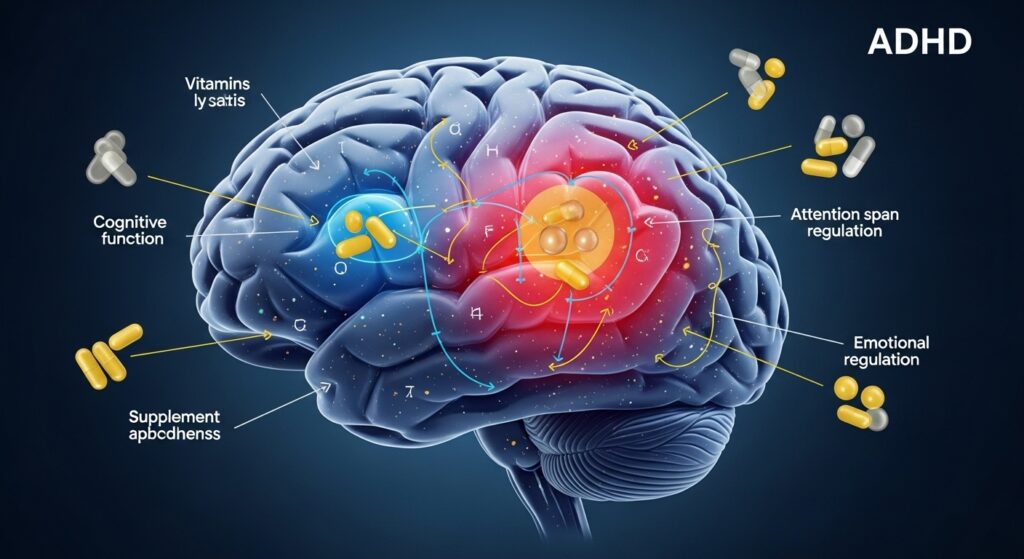
Safe ADHD treatment options include quality multivitamins. They fill nutritional gaps in the diet. Omega-3 supplements support brain development. Magnesium helps with sleep and hyperactivity.
Always consult healthcare providers before starting supplements. They can interact with other medications. Professional guidance ensures safe and effective use. Quality matters more than quantity with supplements.
How Can Parents Help Children with ADHD Without Medication?
Parents play the most crucial role in drug-free ADHD solutions. Consistency in daily routines helps children thrive. Clear expectations and immediate feedback work best. Positive reinforcement motivates better behavior.
Structure becomes the child’s best friend. Visual schedules help with transitions. Breaking tasks into smaller steps prevents overwhelm. Celebrating small victories builds confidence and motivation.
Alternative approaches to ADHD include creating supportive environments. Reducing distractions at home and school helps. Providing fidget tools can improve focus. Understanding the child’s unique needs guides interventions.
Communication with teachers is essential. They need to understand the child’s challenges. Working together creates consistent support systems. This teamwork multiplies the effectiveness of interventions.
What Are the Side Effects of ADHD Medications to Avoid?
Common medication side effects include sleep problems and appetite loss. Growth delays affect some children on stimulants. Mood changes and irritability often occur. Some children experience rebound symptoms.
Heart problems represent serious concerns. Blood pressure changes require monitoring. Addiction potential exists with stimulant medications. These concerns worry many parents and individuals.
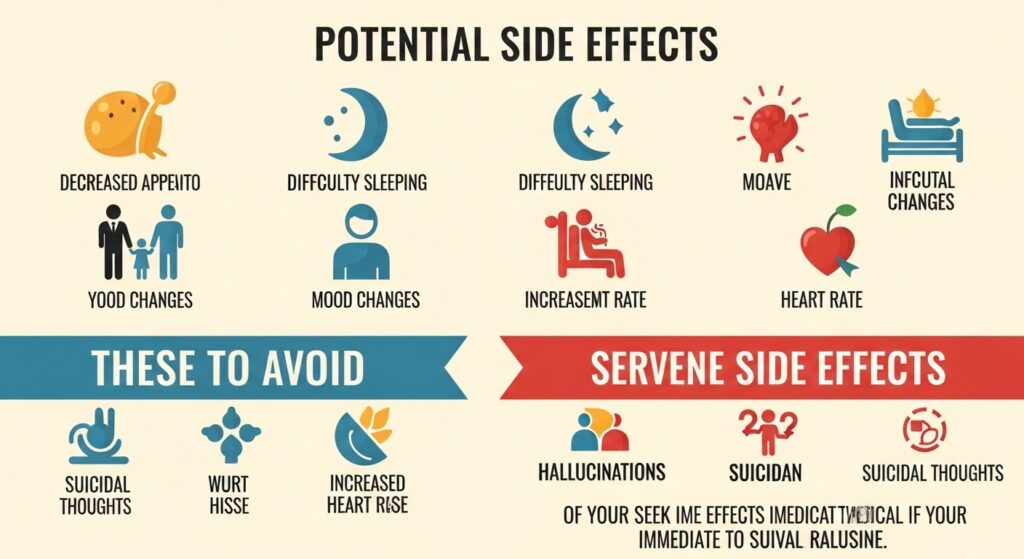
Non-pharmaceutical ADHD treatment avoids these complications entirely. Natural approaches work with the body’s systems. They build long-term skills rather than temporary fixes. The benefits continue even when treatments stop.
Emergency room visits sometimes result from medication reactions. Severe side effects can be life-threatening. Natural approaches carry minimal concerns. They focus on overall health improvement.
READ THIS BLOG : How long does it take for a person’s lung to heal after quitting smoking?
When Should You Consider Natural ADHD Treatments Over Medication?
The holistic ADHD approach works best for mild to moderate symptoms. When side effects outweigh benefits, natural methods shine. Children under six should try behavioral therapy first. Adults concerned about addiction prefer natural options.
Comprehensive ADHD management often combines multiple approaches. Starting with natural methods builds a strong foundation. Medication can be added later if needed. This approach minimizes concerns while maximizing benefits.
Pregnancy and breastfeeding require special consideration. Natural approaches are safer during these times. They don’t affect developing babies. These methods support both mother and child.
Therapeutic approaches to ADHD work well for motivated individuals. They require more effort than taking pills. The results often last longer and feel more satisfying. Personal growth accompanies symptom improvement.
Frequently Asked Questions
How long does it take to see results from natural ADHD treatments?
Most people notice improvements within 2-6 weeks of consistent natural treatment. Exercise effects can be seen immediately, while dietary changes may take longer to show full benefits.
Can natural treatments completely replace ADHD medication?
For many people, yes. Children with mild symptoms and motivated adults often succeed with natural approaches alone. Severe cases may need combination treatments for best results.
Are natural ADHD treatments safe for all ages?
Natural treatments are generally safe for all ages when properly implemented. However, supplements should be discussed with healthcare providers, especially for children and pregnant women.
Do natural ADHD treatments work for adults too?
Absolutely. Adults often respond very well to exercise, sleep optimization, and behavioral strategies. Many adults prefer natural approaches to avoid medication side effects at work.
What’s the most important natural treatment to start with?
Behavioral therapy combined with regular exercise provides the strongest foundation. These two approaches complement each other and create lasting positive changes in daily functioning.
Conclusion
ADHD management strategies don’t have to rely on medications alone. Natural approaches offer effective, safe alternatives for many individuals. The key lies in finding the right combination of treatments. Focus improvement techniques like exercise, proper nutrition, and behavioral therapy create lasting change.
These methods address root causes rather than just symptoms. With patience and consistency, natural treatments can transform lives. They build skills that benefit individuals far beyond ADHD symptom management. The journey toward better health starts with a single step toward natural healing.
